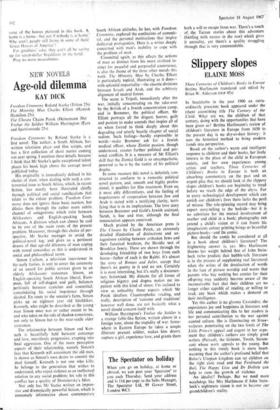NEW NOVELS
Age-old dilemma
KAY DICK
Freedom Ceremony Roland Starke (Triton 25s) The Minority Man Charles Elliott (Hamish Hamilton 25s) The Chosen Chaim Potok (Heinemann 30s) Yoshar the Soldier William Harrington (Eyre and Spottiswoode 25s) Freedom Ceremony by Roland Starke is a first novel. The author, a South African, has written television plays and film scripts, and has a first collection of short stories coming out next spring. I mention these details, because' I think that Mr Starke's quite exceptional talent places his book high above the average novel published today. His originality is immediately defined in his choice of slant, when dealing with such a con- troversial issue as South Africa, which, in recent fiction, has mostly been illustrated chiefly through political and social ramifications that relate to the colour problem. Freedom Cere- mony does not ignore these basic matters, but dilutes them through the rather more subtle channel of antagonisms which exist between Af ri ka a ners and English-speaking South Africans. A division which can almost be said to be one of the main roots of the present problem. Moreover, through this choice of per- spective, Mr Starke manages to avoid the political-novel tag, and gives us a pertinent drama of that age-old dilemma of man coping with moral cowardice as this is understood in social and philosophical terms.
Simon Carlson, a television interviewer in his early forties, is sent to cover the ceremony of an award for public services given to an elderly Afrikaaner statesman. Simon, an English-speaking South African liberal, Euro- pean, full of self-disgust and guilt, balances perilously between cynicism and committal; consolidating his social impotence through alcohol. En route to the senator's farm, Simon picks up an eighteen year old hitchhiker, Kenneth, who might be described as the young man Simon once was or rather meant to be, and who takes on the role of shadow conscience, not only to Simon but to the near-senile older statesman.
The relationship between Simon and Ken- neth is beautifully held between contempt and love, mercilessly progressive, erupting into final aggression. One of the more perceptive aspects of their relationship, namely Simon's fear that Kenneth will assassinate the old man, is shown as Simon's own desire to commit the deed himself. Kenneth is not one who kills; he belongs to the generation that wishes to understand, who reject violence as an ineffectual solution to any social problem; his role in this conflict has a quality of Dostoievsky's Idiot.
Not only has Mr Starke written an impres- sive and dramatically powerful fiction, which is immensely informative about contemporary
South African attitudes, he has, with Freedom Ceremony, explored the confusions of commit-, tal. and the personal motivations that inspire dedicated protagonists. Here is a writer deeply concerned with man's inability to cope with the problem of man.
Committal again, as this affects the actions of man as distinct from his more civilised in- stinct for peaceful and purposeful coexistence, is also the theme of the three other novels this week. The Minority Man by Charles Elliott is particularly topical, illustrating as it does— with splendid impartiality—the chaotic divisions between Israeli and Arab, and the arbitrary alignment of neutral forces.
The scene is Tripoli, immediately after the war, initially concentrating on the take-over by the British of a Jewish concentration camp, and in Bremmer, the political officer, Mr Elliott portrays all the disgust, horror, guilt and passion to make amends that inspire all of us when forced to think deeply about this degrading and utterly beastly chapter of social sadism. Such feelings—hardly expressible in words—make Bremmer ask for a Jewish medical officer, whose Zionist passion, though understood, creates further political and per- sonal conflicts. It is a measure of Mr Elliott's skill that the Zionist Gold is so unsympathetic, powered as he is by the vanity of his political dogma.
In some measure this novel is definitely con- structed to conform to a romantic political novel pattern, and, smooth and highly profes- sional, it qualifies for film treatment. Even so, it most ably differentiates, and the feeling of hopelessness of cooperation between Jew and Arab is stated with a terrifying clarity, terri- fying that is in its implications. The love story between Bremmer and Gold's Jewish assistant, Sarah, is fine and true, although the final renunciation appears contrived.
Much praised by the American press is The Chosen by Chaim Potok, an extremely detailed illustration of distinctions and an- tagonisms existing between orthodox Jews and their fanatical brethren, the Hesidic sect of Brooklyn Jewry. These are shown through the developing friendship of two boys from each house—father of each is the Rabbi. It's almost the story of Romeo and Juliet, except that there's no poetry in it and no sex. Certainly it is most interesting, but it's really a documen- tary fictionised. My distaste for all forms of religious bigotry and dogma makes me im- patient with this kind of stress; I'm inclined to view as unhealthy those aspects which Mr Potok idealises. Claustrophobic reading, and really, description of 'customs and traditions' however well done, are not basically what a novel should concern itself with.
William Harrington's Yoshar the Soldier is a strange fable-like fiction, written almost in a foreign tone, about the stupidity of war. Some- where in Eastern Europe he takes a simple illiterate peasant soldier, makes- him desert, capture a girl, experience love, and grants them
• . • both a will to escape from war. There's a touch of the Tarzan stories about this adventure (bittling with nature in the raw) which gives it unreality, yet there's a quality struggling through that is very commendable.






























 Previous page
Previous page